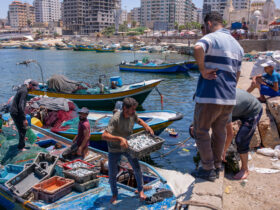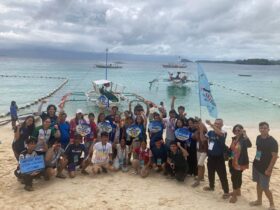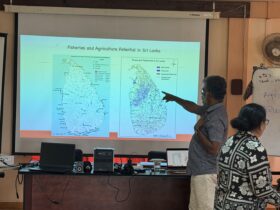Statement made at: The National Workshop on Sustainable Small-scale Fisheries: Towards FAO Guidelines on Marine & Inland Small-scale Fisheries. Kolkata, India.19 – 21 September 2011.
Organized by: National Fishworkers’ Forum (NFF). In Collaboration with the International Collective in Support of Fishworkers (ICSF).
We, 62 participants representing the inland and marine fishing communities, fishworker organizations, and non-governmental organizations, having gathered at the National Workshop on Sustainable Small-Scale Fisheries: Towards FAO Guidelines on Marine and Inland Small- Scale Fisheries, from 19 to 21 September 2011 in Kolkata, West Bengal, India;
Welcoming the decision of the 29th Session of the Committee on Fisheries (COFI) of the Food and Agriculture Organization (FAO) of the United Nations to develop a set of voluntary guidelines addressing both inland and marine small-scale fisheries that would draw on relevant existing instruments, and would complement the FAO Code of Conduct for Responsible Fisheries;
Noting that about 14 million people are directly dependent on fisheries in India for their life and livelihood, and that vast majority of them are dependent on small-scale fisheries;
Recognizing that fishing has a long tradition in India, and that social development issues are common to all fishers from traditional fishing communities;
Further noting that small-scale inland and marine fisheries provide employment, income and nutritional security, especially to the poor;
Drawing attention to the critical role played by women within fisheries and fishing communities and the need for specific focus on supporting and empowering women;
Call upon the Government of India, the States, the Union Territories, and the Panchayats, as appropriate, to address our concerns and to recognize and defend the rights of small-scale fishing communities, as mentioned below:
Small-scale fisheries
1. In the Indian inland sector, both freshwater capture fisheries and sustainable forms of culture-based capture fisheries, primarily dependent on indigenous species, are small-scale fisheries for us. In the Indian marine fisheries sector, however, only fishing operations by vessels below 20 m length that do not operate trawl, employ no mechanized towing or hauling power, where owners are full-time fishers and where fishing gear is manually operated, are considered small-scale fishing operations by us. Small-scale fishers would include: owner-operators from traditional fishing communities, fishworkers, allied workers in the above fishing operations, as well as women engaged in post-harvest activities.
Resource Management
2. Respect, protect and secure the rights of traditional fishing communities to fishing grounds and resources, considering the importance of fishery resources to their life, culture and livelihood.
3. Recognize and protect the traditional rights of small-scale fishing communities to fish, including in national parks and sanctuaries. The provisions of the Forest Rights Act, 2006 and those of the Wildlife (Protection) Amendment Act, 2006, that protect the rights and occupational interests of traditional fishing communities should be implemented in this context.
4. Facilitate bottom-up processes for managing marine and inland fisheries by revitalizing traditional institutions and by employing traditional knowledge of fishers, within an appropriate policy and legal framework.
5. Make appropriate arrangements to facilitate utilization of water bodies such as ponds, lakes, wetlands, reservoirs and canals for the purpose of fishing.
6. Develop a uniform inland fisheries policy through a participatory process.
7. Protect or grant the right to fish, and to manage fisheries, in inland public water bodies to traditional inland fishing communities.
8. Vest fishing communities with the right to manage resources, including in national parks and sanctuaries.
9. Implement the marine fishing regulation act (MFRA). The MFRA and related instruments should be amended to facilitate participatory management of fishery resources.
10. Adopt measures to phase out bottom trawling from territorial waters over a period of five years, considering its negative impact on marine ecology, biodiversity and the distribution of marine fishery resources.
11. Promote selective and location-specific fishing gear. Prohibit destructive fishing gear such as purse-seine and fine-meshed gear in shrimp seed collection, considering their negative impact on biodiversity.
12. Prohibit the construction of new trawlers and purse-seiners under the National Cooperative Development Corporation (NCDC) schemes for fisheries development, with immediate effect.
13. Restrict the ownership of fishing vessels to one vessel per fishing family. Community-based organizations may be involved in regulating the number of fishing vessels at the local level. Community consent may be taken before registering a new fishing vessel.
14. Cancel fishing vessels under the Letter of Permission (LOP) facility and promote vessels fully owned and operated by Indian fishing communities that have the capacity to safely harvest fishery resources such as tuna and tuna-like species in the Indian exclusive economic zone (EEZ).
15. Guarantee preferential access to small-scale fisheries in the Indian maritime zones, also upholding the spirit of Murari Committee (1996) observations and updating its recommendations.
16. Urgently enact legislation for managing fisheries in the Indian EEZ, also taking into consideration the recommendations of the Majumdar Committee (1978).
Coastal and marine environment protection
17. Protect inland, coastal and marine ecosystems from pollution and habitat destruction.
18. Do not permit nuclear and thermal power plants, chemical and other polluting industries to be set up near the coast and water bodies, including wetlands.
19. Consider all factors, including ecological ones, and the threat of coastal erosion, while designing ports and harbours.
20. Establish an inter-departmental co-ordination mechanism to address coastal, marine and inland pollution, encroachment and other issues, with all concerned ministries and departments on behalf of small-scale fishers. The State fisheries departments should take up this responsibility.
Rights to land and housing
21. Secure the rights of fishing communities to land for housing and for fishery-related activities. Land titles (pattas) should be issued for housing, and space used for fishery-related activities should be protected as common property.
22. Protect the rights of fishing communities to housing in urban and tourist areas. Land, as required, should be acquired to assure decent housing for fishing communities.
23. Recognize and secure the land rights of fishers and fishing communities (in relation to both private and common property) in land revenue records.
Rights to social and economic development
24. Guarantee specific forms of protection to traditional fishing communities to enable them improve their socio-economic status.
25. Equip fishing villages with basic services, such as health care, potable water, sanitation and electricity.
26. Extend primary health care to all fishing communities. Yeshasvini Health Insurance Scheme of Karnataka government could be a good practice to be followed by other States.
27. Deliver nutritional support to pregnant women and children in food-insecure fishing communities.
28. Ensure access to education in fishing villages. Education up to matriculation, including residential facilities at educational institutions, should be made freely available.
29. Provide access roads to fishing villages where they are lacking, as in States on the East Coast of India.
30. Develop hygienic landing centres and all-weather approach roads in fishing villages. Basic facilities such as ice boxes, storage facilities for fishing gear, and toilets for women should be provided at the landing centres.
31. Undertake a census of inland fisher/fishing communities.
32. Enumerate women’s work in both inland and marine fisheries.
33. Revive and strengthen fisheries co-operative societies, and support appropriate forms of economic organizations, including self-help groups (SHGs), and fully respect their autonomy.
34. Ensure that access to credit and government schemes, and other economic benefits, are not restricted to the members of co-operative societies.
35. Guarantee credit at reasonable rates of interest to enable all fishworkers to attain economic empowerment and to free themselves from unscrupulous moneylenders.
36. Consider production-enhancing subsidies in small-scale fisheries, subject to the status of fishery resources.
37. Provide adequate compensation to fishers whose livelihood activities are affected due to activities such as oil spill, oil and gas exploration and exploitation, conservation programmes and maritime transport.
38. Ensure diversified livelihoods and appropriate training to fishing communities to reduce pressure on the fishery sector. In this context, fishing community-based tourism, production value-added products, and employment of local fisher youth in marine and coastal police, and as lifeguards, should be promoted.
Post-harvest activities
39. Provide hygienic fish markets, basic amenities, transport facilities and assistance to maintain cold chains.
40. Redevelop/upgrade existing fish markets, to ensure hygiene and access to basic facilities such as water, sanitation, and storage.
41. Issue identity cards to fish vendors, including women fish vendors.
42. Protect access of women of fishing communities to fish resources for processing, marketing and food.
43. Provide transport facilities to fish vendors, particularly if they lack access to public transport, or are denied access to it.
44. Take steps to eliminate harassment faced by women in fish markets, in particular, and ensure safe workplace for women.
Labour, working and living conditions
45. Ratify and implement the ILO’s Work in Fishing Convention, 2007, and extend its provisions to all fishers, to improve their working and living conditions.
46. Implement uniform social security for all fishers and fishworkers across all States and Union
Territories and reduce the minimum age for their old age pension to 50 years.
47. Guarantee access to social security for all those who are engaged in fishery-related activities.
48. Enhance the contribution of the Centre and State governments to the Saving-cum-Relief Scheme to ensure higher monthly payment during closed season. The scheme should be inclusive of inland fisheries and women fish vendors of all States, fish sorters, driers and vendors.
49. Provide toilets on board fishing vessels considering that many fishers meet with accidents while using gunwale as toilet or while using portable toilets on board trawlers and purse seiners.
50. Prevent child labour in fisheries and fishing communities, and protect the right of the child to education. Schools for child workers below the age of 14 years should be set up in coastal areas. In this context, the school for child workers in brick kilns of Orissa may be considered a model.
51. Provide training in, and access to, diversified livelihoods to fishing communities to prevent distress migration.
Climate change and disaster preparedness
52. Utilize effectively the financial resources earmarked for disaster preparedness in the context of natural or man-made calamities of concern to the fishing communities.
53. Take steps to prepare both inland and marine fishing communities for disasters such as flood, sea surge and drought, and other unexpected forms of natural or man-made calamities.
54. Train traditional fishers in disaster preparedness. Periodic drills should be conducted to prepare coastal communities to speedily evacuate from affected areas in the event of an industrial or nuclear accident, or catastrophe.
55. Take steps to ensure that incidents of old ships being accidentally or deliberately sunk in coastal waters are minimized, given the devastating impact of such incidents on fishing activities.
56. Develop, in a participatory way, the adaptive capacity of fishing communities to meet challenges of climate variability and change such as flood and cyclone, and shift or extension in distribution of fishery resources.
57. Introduce fuel-efficient engines and promote bio-degradable fishing gear, towards mitigation, employing financial incentives. Training programmes should be developed to facilitate improved navigation and fishing methods to reduce fuel consumption, as well as to facilitate fishing community initiatives to protect and develop coastal vegetation and features.
58. Create a special fund for cyclone relief, especially to ensure speedy response. Cyclone shelters should be provided in all cyclone-prone States, especially on the East Coast of India.
Capacity-building
59. Strengthen capacity building programmes among fishing communities to enhance their awareness of rights, government schemes, and resource management.
60. Establish systems to ensure that fishing communities are consulted during the process of formulating legislation or policy that could have an impact on their life and livelihood, and to enhance their capacity to engage meaningfully in such processes.
Keeping in mind the above, we urge the Government of India to develop a national policy on small-scale fisheries to protect the rights and interests of small-scale fishing communities.
The States, the Union Territories and the Panchayats may also draw upon this Statement in their policies and programmes for sustainable small-scale fisheries.
We also call upon FAO to draw elements from this Statement in its preparation of voluntary guidelines on sustainable small-scale fisheries.





Leave a Reply